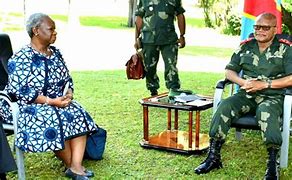
The United Nations Security Council (UNSC) heard this week of progress with formation of a new government in the Democratic Republic of Congo (DRC) and, on the negative side, “significant advances” by the M23 rebel force.
Bintou Keita, UN Secretary-General Antonio Guterres’ Special Representative in the Central African country who also heads the UN mission, MONUSCO, told the UNSC the security and humanitarian situation in the east of the country – where a Southern African Development Community (SADC) mission and force is in the throes of deployment – “has further deteriorated”.
Progress as regards a new government post the December elections, she said, is “underway”.
On M23, she told the 15-member Security Council the Rwanda-backed rebel group “is making significant advances and expanding its territory to unprecedented levels”. Also on humanitarian, human and civil security issues, she drew attention to atrocities committed by another rebel group – the ADF (Allied Democratic Forces) – active in the eastern DRC. She pointed to 200 civilian deaths since the start of 2024 on the Ituri/North Kivu provincial border.
She said the insecurity is fuelled by the actions of the Coalition of Congolese Democrats (CODECO), Zaire, Patriotic Resistance Front of Ituri, Patriotic Force and Integrationist of Congo for Bira and ADF.
Keita repeated a call previously made to all foreign forces illegally operating in DRC to withdraw saying “there is no sustainable military solution to the conflict”.
“Escalation of tensions between Rwanda and Burundi which led to the closing of their border by Bujumbura is an additional issue which could lead to destabilisation of the province and the region,” she warned.
Against an ongoing violence background, MONUSCO is working with national and provincial authorities in the country on implementing the first phase of the mission disengagement plan. To date this has seen the MONUSCO base Kamanyola handed to the Congolese National Police (Police Nationale Congolaise).
Condemning attacks on peacekeepers, Keita said: “Our blue helmets have been subject to direct and indirect shots from different belligerent parties.” Turning to the humanitarian crisis, she said more than 7.1 million people have been displaced within the country while 23.4 million suffer from food insecurity. “One Congolese person out of four faces hunger and malnutrition making the DRC the country most affected by food insecurity,” she added.
The town and peripheral area of Goma are dealing with massive waves of internal displaced persons. Also highlighting the large number of cases of gender-based violence and sexual exploitation, she said in January alone, 10,000 cases were seen throughout the country. The 2023 humanitarian response plan for the country received only 40 per cent of the $2.25 billion required, she said, calling for an adequate response.
- A Tell report











